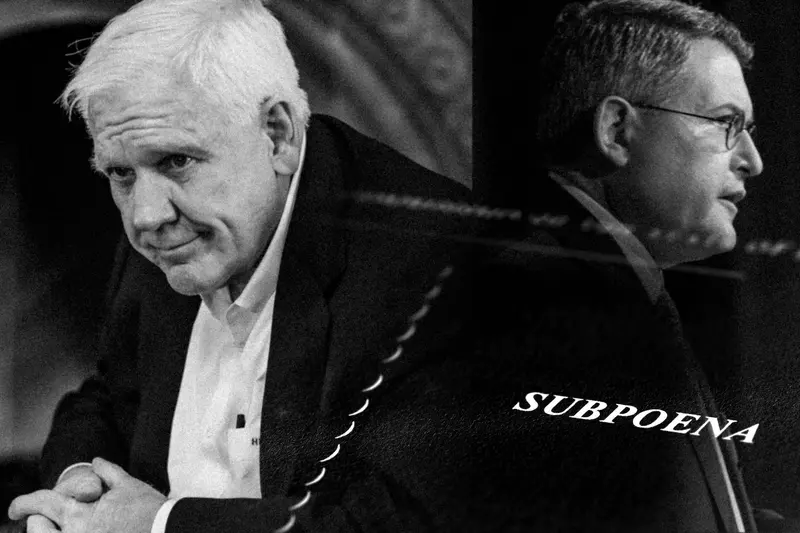More than two months after authorizing subpoenas for key figures in the Supreme Court’s ethics controversies, Senate Democrats have yet to issue them. The delay has caused outside activists to demand that Democrats press ahead with their investigation.
On Nov. 30, the Democratic-led Senate Judiciary Committee voted to approve subpoenas for Republican donor Harlan Crow and conservative legal activist Leonard Leo after the two men had refused to voluntarily provide all the information requested by the committee about gifts for Supreme Court justices.
“Both Leonard Leo and Harlan Crow are central players in this crisis,” Sen. Dick Durbin, D-Ill., who chairs the Judiciary Committee, said at the time. “Their attempts to thwart legitimate oversight efforts of Congress should concern all of us.”
But in an interview last week, Durbin told ProPublica that he had not yet issued the subpoenas to Crow and Leo. Questioned about the timing or what issues remained to be worked out, he said only: “Still working on it.”
The decision to authorize subpoenas came in response to stories by ProPublica that detailed how, for decades, Crow had paid for lavish vacations for Justice Clarence Thomas. In 2014, Crow purchased Thomas’ mother’s home in Georgia. Crow even paid private school tuition for Thomas’ grandnephew, whom the justice said he was raising “as a son.”
Thomas did not disclose the vacations, real estate purchase and tuition assistance on his annual financial disclosure forms. After ProPublica’s reporting, the Supreme Court adopted its first-ever ethics code, though it’s not clear if and how it will be enforced. Thomas has said that he did not need to disclose the free vacations and that he didn’t report the real estate sale because he misunderstood the rules. Crow has said he has never tried to influence Thomas on any matters.
ProPublica also revealed that Leo, the influential lawyer and Federalist Society co-chairman, arranged a luxury fishing trip to Alaska for Justice Samuel Alito in July 2008 that Alito also did not disclose. Alito flew to Alaska on a private plane provided by Paul Singer, a hedge fund billionaire and major conservative funder.
Several years after the trip, one of Singer’s companies had a case before the Supreme Court that Alito ruled on. Singer’s company won by a near-unanimous ruling. Alito says he did not need to disclose the trip or recuse himself from the case. Singer has said he never discussed his business with the justice.
Leo is considered one of the most powerful figures in U.S. politics, an architect of the Supreme Court’s conservative supermajority and now the leader of a billion-dollar dark-money fund aimed at reshaping American culture and government.
Leo and Crow did not respond to requests for comment.
In the recent interview, Durbin would not give a reason for the delay in sending the subpoenas. Sen. Sheldon Whitehouse, D-R.I., a Judiciary Committee member and vocal supporter of court reform, told ProPublica that the committee’s November authorization vote gave Durbin leverage to get information from Crow and Leo without legally issuing the subpoenas.
“The authority to have the chairman issue those subpoenas has put him in a much-improved negotiating position,” Whitehouse said. “I’ll just leave it at that.”
It’s not uncommon for congressional committees to authorize a subpoena and then ultimately obtain information voluntarily through negotiations, according to a Congressional Research Service analysis. However, Leo said in November that he would not cooperate with the Judiciary Committee’s efforts, which he called an “unlawful campaign of political retribution.” A Crow spokesperson said then that the committee’s inquiry was “invalid” but added that Crow had offered “extensive information” to the committee and “remains willing to engage with the committee in good faith, just as he has consistently done throughout this process.”
Christina Harvey, executive director of the anti-corruption group Stand Up America, said that the Judiciary Committee’s efforts to address the Supreme Court’s ethics controversies would remain “incomplete” if the committee didn’t get all the information it requested. “Crow and Leo’s insistence that the law does not apply to them should not intimidate or deter Judiciary Democrats,” Harvey said.
If Durbin’s committee did eventually issue the subpoenas to Crow and Leo and the two men still refused to comply, the Judiciary Committee could seek to enforce the subpoenas by filing suit in federal court. It could also make a criminal contempt certification to the Justice Department for the refusal to cooperate with a legal subpoena.
A civil suit would require a vote in the Senate to approve the legal action, and the Democrats might not win it with their slim majority. The suit itself could take months or years to play out, as happened in other recent subpoena fights.
Alex Aronson, executive director of the advocacy group Court Accountability and a former legal counsel to Whitehouse, told ProPublica that making a criminal contempt certification typically requires a majority vote in the House or Senate. But Aronson said that such a vote wasn’t legally required under his interpretation of the relevant statute, and that Durbin’s committee should consider all options to get the information it seeks.
“There is too much at stake for Chair Durbin to capitulate to Republican stonewalling and bad faith now,” he said. “I’m hopeful and confident he will see this through.”
Feb. 16, 2024: This story originally misstated the relative whom Supreme Court Justice Clarence Thomas said he was raising “as a son.” It was his grandnephew, not his nephew.












